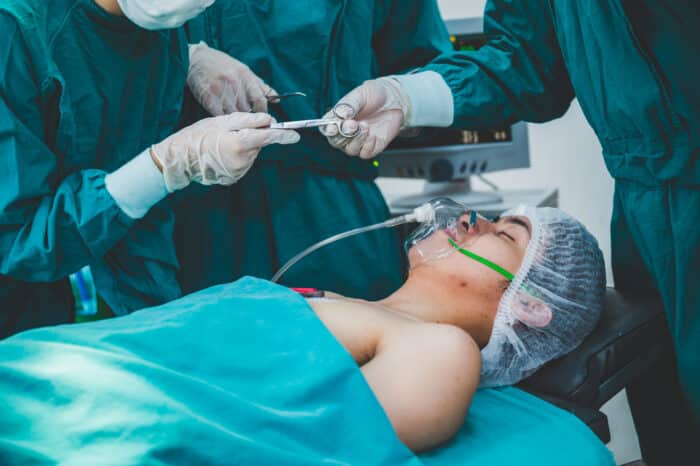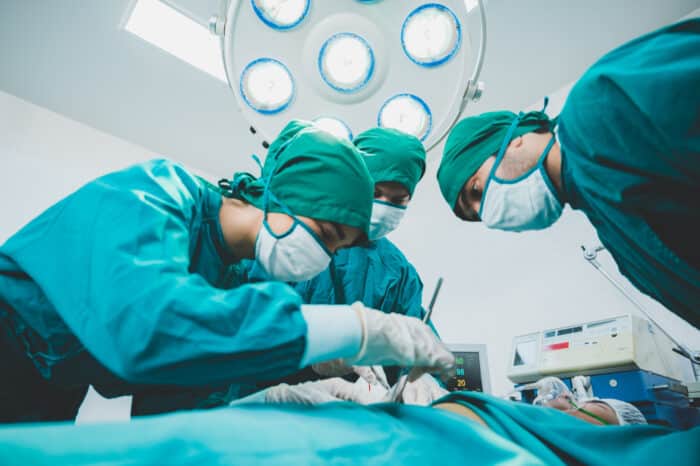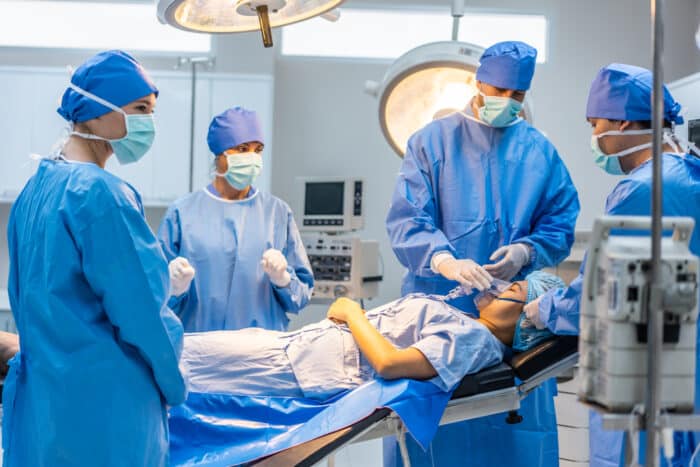In the world of healthcare, the role of a Surgical Tech is indispensable. Rightly so, because they enable the surgeons to focus on their expertise while taking care of the rest.
As a surgical tech, you possess unique skills to be useful in the operating room. Thus contributing to patient safety, the success of surgical procedures, and the overall efficiency of the healthcare system.
If you have ever wondered about the significance of a career as a surgical technologist, we’ll delve into the reasons why they are critically important.
In this article, we will also discuss the skills you need to hone to become successful in this field, explore their roles and responsibilities, what’s a day in their life like, and much more.
Stay tuned –
Why is Surgical Tech important?
A Surgical Technologist is a crucial member of a surgical team who assists surgeons, nurses, and other medical professionals in the operating room (OR) during surgical procedures.
They maintain a sterile environment, work with precision, and assist surgeons during surgical procedures which contributes to the well-being of patients.
They are valuable and are like a guiding hand in the operating room, and their contribution to ensuring the smooth and safe conduct of surgeries is applaudable.
We need them because –
- They ensure patient safety.
- They facilitate surgical precision.
- They anticipate needs and enhance efficiency.
- They are a supportive presence to patients.
- They contribute to emergency response.
- They uphold ethical and professional standards.
- They support the healthcare system.
Specialized Areas where we find CSTs
Many surgical techs opt for roles in general surgery or rotate through various specialties, but others prefer to specialize and work in a specific surgical field. It depends on your interests and skills.
Some of the specialized areas where we find surgical techs are –
- General Surgery
- Cardiology
- Neurosurgery
- Organ transplantation
- Orthopedic
- Pediatric surgery
- Plastic surgery
They are also referred to as
The Surgical Techs are also known by other titles like –
- Surgical Technologist
- Surgical Technicians
- Operating Room Technicians or the OR Tech
- Surgical Tech
- Scrub or Scrub Tech
More On:
-> Surgical Tech Certification
-> How to Become a Certified Surgical Tech?
Surgical Tech Skills
Entering the dynamic world of surgical technology is a commendable career choice, one that places you at the forefront of healthcare, helping save lives and ensuring the smooth execution of surgical procedures.
As a surgical technologist, you’ll find yourself immersed in a fast-paced environment where your skills play a pivotal role in patient care.
To excel in this profession, you’ll need a unique set of skills, each holding its significance – attention to detail, manual dexterity, communication, stress management, infection control, and adaptability are all essential traits that contribute to your success and the well-being of your patients.
Mastering these skills will not only make you a valuable asset to the surgical team but also ensure the best possible outcomes for those under your care.
Read More:
-> Online Surgical Tech Programs
-> Surgical Tech Classes & Courses
-> Surgical Tech Program & Training
Let’s explore the skills in detail –
Attention to Detail
As a surgical technologist, you must have an exceptional eye for detail. You’ll be responsible for preparing the operating room, ensuring all instruments are sterilized, and maintaining a sterile field throughout the procedure.
You must anticipate the surgeon’s needs, pass instruments accurately, and double-check counts to prevent any foreign objects from being left inside the patient.
Why it’s Important?
The consequences of overlooking details in the OR can be severe. Attention to detail ensures patient safety by reducing the risk of infections and complications. It also contributes to the overall efficiency of the surgical team.
Manual Dexterity
To succeed in this field, you need excellent hand-eye coordination and manual dexterity.
You’ll be handling delicate surgical instruments, suturing, and assisting in complex procedures, requiring precise and controlled movements.
Why it’s Important?
Your ability to handle instruments with precision directly impacts the surgeon’s effectiveness. It minimizes the risk of tissue damage and helps ensure the best possible outcomes for patients.
Also Read:
Communication Skills
Effective communication is paramount in the operating room. You should ensure effective communication with the surgical team, including the surgeon, nurses, and anesthesiologist.
You should convey important information and anticipate the team’s needs, ensuring a smooth workflow.
Why it’s Important?
Miscommunication in the OR can lead to errors and potentially life-threatening situations. Clear and concise communication helps maintain a safe and efficient surgical environment.
Stress Management
Surgical procedures can be intense and high-pressure situations. So, you must remain calm and composed, even during emergencies or unexpected complications.
Why it’s Important?
Stress management is essential for your well-being and the well-being of the patient. Remaining focused and composed in stressful situations ensures that you can provide the best possible support to the surgical team and maintain patient safety.
Infection Control
You must have a deep understanding of infection control protocols. You’ll be responsible for maintaining a sterile field, using personal protective equipment (PPE), and following strict hand hygiene practices.
Why it’s Important?
Infection control is critical to preventing surgical site infections, which can lead to complications for the patient. Your meticulous adherence to these protocols protects both patients and the surgical team.
Adaptability
Flexibility and adaptability are vital in the ever-changing environment of surgery. You’ll encounter various surgical procedures, surgeons, and team dynamics, requiring the ability to adapt quickly
Why it’s Important?
Adaptability ensures that you can seamlessly integrate into different surgical teams and handle a wide range of procedures. It contributes to the overall efficiency of the OR.
Physical Stamina and Endurance
As a Surgical technologist, you require physical stamina and endurance to withstand the demands of the operating room environment.
You’ll be on your feet for extended periods, often in the same position, during surgeries that can last beyond 6 or 8 hours.
Why it’s Important?
Maintaining physical stamina ensures that you can perform your duties effectively without fatigue, which could compromise patient safety. Prolonged surgeries are common, and your ability to stay focused and alert is vital.
Lifting, Positioning, and Draping
You need the strength to assist in the proper positioning of patients on the operating table, draping them with sterile covers, adjusting their limbs, or helping with patient transfers.
Why it’s Important?
Incorrect positioning or draping can obstruct the surgical field or lead to patient discomfort. Your skill in this area helps create an optimal environment for surgery.
Also, proper patient positioning is crucial for the patient’s comfort and safety. Your physical strength and skill in this area play a significant role in ensuring the best surgical outcomes.
Use of Surgical Equipment
You’ll operate and manipulate various surgical equipment and devices, such as cautery machines, suction devices, and electrosurgical units. Understanding how to use these tools safely and effectively is essential.
You must be skilled in handling delicate and often sharp surgical instruments with precision. This includes passing instruments to the surgeon during procedures and maintaining control over these instruments.
Why it’s Important?
Instrument handling is a fundamental aspect of your role. Your dexterity and ability to handle instruments safely contribute to the overall efficiency and safety of the surgical team.
Also, the proper use of surgical equipment ensures the surgeon’s ability to perform procedures smoothly and safely. Incorrect use could lead to complications or injuries.
Surgical Tech Roles and Responsibilities
Embarking on a career as a surgical technologist places you at the heart of healthcare, where your expertise ensures the safe and efficient execution of surgical procedures.
As a surgical technologist, you hold a pivotal role in the operating room, where precision and your commitment to patient safety are paramount.
Your roles and responsibilities, from preparing the environment to assisting during surgery and maintaining sterility, all contribute to the success of surgical procedures.
Your commitment to these responsibilities not only enhances patient outcomes but also ensures the integrity and efficiency of the surgical team.
Now, let’s explore the Duties of a CST –
Preparing the Operating Room
Your role in the operating room is instrumental in safeguarding patient well-being and contributing to successful surgical outcomes.
Before the surgical team enters the operating room, you will meticulously prepare the environment. This includes sterilizing surfaces, arranging surgical instruments, and ensuring all necessary equipment and supplies are readily available.
Why it’s Important?
A well-prepared operating room is the foundation of a successful surgery. Your attention to detail in setting up the sterile field minimizes the risk of infection and ensures that surgeons have quick and easy access to instruments and supplies when needed.
Assisting During Surgery
You play a vital role in assisting the surgeon during surgical procedures. This includes passing instruments, holding tissues, and anticipating the surgeon’s needs to maintain a smooth workflow.
Why it’s Important?
Your assistance directly impacts the surgeon’s effectiveness and the patient’s safety. By providing the right instrument or aid at the right time, you contribute to the precision and efficiency of the surgery.
You May Also Like:
-> Can You Be a Surgical Tech Without Certification?
-> Sterile Processing Technician vs Surgical Technologist
Maintaining a Sterile Field
Maintaining a sterile field throughout the procedure is paramount. You’ll ensure that no contaminants enter the surgical area, follow strict infection control protocols, and monitor the integrity of the sterile field.
Why it’s Important?
Infection control is critical in preventing surgical site infections. Your diligence in maintaining sterility protects both the patient and the surgical team from potential complications.
Instrument Handling and Counting
You will be responsible for the proper handling of surgical instruments, passing them to the surgeon, and keeping an accurate count of instruments used to prevent leaving any objects inside the patient.
Why it’s Important?
Precise instrument handling and counting reduce the risk of errors, complications, and the need for follow-up procedures. It is crucial for patient safety and post-operative well-being.
Patient Care and Safety
Beyond technical aspects, you will also assist in patient care by positioning and prepping the patient, ensuring their comfort, and maintaining their safety throughout the procedure.
Why it’s Important?
Patient comfort and safety are paramount. Your attention to these aspects contributes to a positive patient experience and helps prevent complications during surgery.
Emergency Response
In emergencies or unexpected complications during surgery, you will assist in responding quickly and effectively to stabilize the situation. This may include providing additional instruments or assisting with life-saving measures.
Why it’s Important?
Rapid response during emergencies can be life-saving. Your ability to remain composed and assist in critical situations is essential for patient well-being.
Read -> Pros And Cons Of Being A Surgical Tech
What’s a Day in the Life of a Surgical Tech like?
A working day for a surgical technologist usually begins in the early morning or late at night. Because most of the surgeries take place during the quiet hours.
Their responsibility revolves around surgery – before, during, and after the surgery. Before the surgery, they meticulously prepare all the necessary equipment, instruments, and supplies.
Once both the patient and surgeon are in place, the surgical procedure can commence. Post-surgery they take care of the OR and sterilize the equipment, by following strict infection control protocols.
Let’s delve deeper –
- The day often starts with setting up the operating room, ensuring it’s sterile and equipped with all necessary instruments and supplies.
- They may review the day’s surgical cases, understanding each procedure’s requirements and potential challenges.
- During surgery, they work alongside the surgical team, passing instruments to the surgeon, holding tissues, and maintaining a sterile field.
- They anticipate the surgeon’s needs, ensuring instruments are readily available and assisting with any unexpected situations.
- Throughout the procedure, they monitor the sterile field, ensuring infection control protocols are followed.
- They assist in patient care by positioning, prepping, and ensuring the patient’s comfort during surgery.
- In case of emergencies or complications, they play a crucial role in responding quickly and efficiently.
- After surgery, they help transfer the patient to the recovery area and participate in the process of cleaning and restocking the operating room.
- They maintain proper documentation of surgical procedures and instrument counts is essential for record-keeping and patient safety.
- They collaborate with surgeons, nurses, anesthesiologists, and other healthcare professionals constantly throughout the day.
- They ensure all instruments are sterilized and ready for the next procedure is vital.
But the working hours are not fixed. Their schedule varies. Some surgical techs work regular shifts, while others may be on-call for emergency surgeries.
As a surgical tech, you are a guiding hand in the operating room, and your contribution reverberates through the healthcare system, making it safer, more efficient, and more compassionate.
Also Read:
-> Is Surgical Tech School Hard?
-> How to Become a Surgical Tech?
FAQs – Surgical Tech
How Long Does It Take to Become a Surgical Technologist?
To become a surgical tech, you need to invest around 1 to 2 years. You can enroll in the Surgical Tech program from a community college or through online schools.
But, as you know with career courses, you need to ensure that the program providers hold accreditation from either the CAAHEP – Commission on Accreditation of Allied Health Education Programs or ABHES – Accrediting Bureau of Health Education Schools.
Also, you need to ensure that you go for the certification as well. Certified Surgical Techs, CSTs, hold more value and are sought after by employers as well.
Read -> How Long Does It Take to Become a Surgical Tech?
Is a Career in Surgical Tech Worth It?
Whether a career in surgical technology is worth it depends on your interests, career goals, and priorities.
Here are some stats and facts to consider when determining if a career in surgical tech is worth pursuing –
Job Demand
Surgical techs are in demand due to the growing number of surgeries, offering good job prospects and stability. As per the BLS, the projected employment growth rate for surgical assistants and technologists is projected to grow by 5% in this decade.
Better Pay
As per BLS salary data 2022, the annual average salary of Surgical Technologists is $55,960, with an hourly rate of around $28. Moreover, among the Surgical Techs, the highest 10% are earning upwards of $78,560 per year, and higher.
More On -> Surgical Tech Salary
Team Environment
You’ll be working closely with healthcare professionals fosters a sense of teamwork and camaraderie.
Quick Entry in less than two years.
Fulfillment by assisting in surgeries and contributing to patient care can be deeply rewarding.
No degrees are required.
Now, we leave it up to your good judgment to decide. But, if we are to answer, we believe a career in Surgical Tech, is definitely worth it.
Do Surgical Techs make more than Registered Nurses?
No!
The RNs go through extensive education and a tough NCLEX-RN certification program while the CSTs even don’t require formal education, in some cases.
So, considering all the factors, a CST doesn’t earn equivalent to RNs. Also, the roles of a CST and RN vary, with the latter carrying more responsibilities.
But, a good aspect of being a CST is, that you can always switch your career to become an RN by getting NCLEX-RN certified.
As per the BLS 2022 salary data, the annual average salary for an RN is around $81,220 while that of a Surgical Tech is around $55,960.
How stressful it is being a Surgical Tech?
Working as a surgical technologist can be highly stressful due to the fast-paced nature of the job. However, it’s a collaborative effort with a team of healthcare professionals, which helps mitigate stress.
Still, there are moments of intense pressure, like medical emergencies where maintaining composure and attention to detail is crucial.
Also, witnessing surgeries and dealing with medical emergencies can be emotionally taxing for some individuals. You may encounter challenging and emotionally charged situations in the OR, which can impact your emotional well-being.
To cope, self-care, including good nutrition, adequate rest, exercise, and leisure activities, is essential for maintaining mental and physical well-being in this demanding profession.
Related:
Related Articles
-
How to Be Successful in College in 2022 – 7 Simple Tips to Succeed
-
How Do Scholarships Work? Read This First…Truth is Shocking
-
7 Best College Majors 2024: What Should I Major In?
-
How to Choose a College – 10 Things You Must Consider in 2024
-
Why Go to College? Top 13 Benefits for Adult Students in 2022
-
Top 5 Best Alternatives to Community College for 2024









